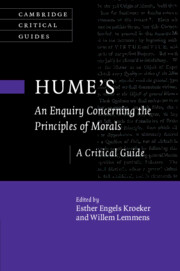10 results

Hume's An Enquiry Concerning the Principles of Morals
- A Critical Guide
-
- Published online:
- 08 January 2021
- Print publication:
- 07 January 2021
Chapter 11 - Hume on Religion in the Enquiry Concerning the Principles of Morals
-
-
- Book:
- Hume's <I>An Enquiry Concerning the Principles of Morals</I>
- Published online:
- 08 January 2021
- Print publication:
- 07 January 2021, pp 219-237
-
- Chapter
- Export citation
Introduction
-
-
- Book:
- Hume's <I>An Enquiry Concerning the Principles of Morals</I>
- Published online:
- 08 January 2021
- Print publication:
- 07 January 2021, pp 1-12
-
- Chapter
- Export citation
Index
-
- Book:
- Hume's <I>An Enquiry Concerning the Principles of Morals</I>
- Published online:
- 08 January 2021
- Print publication:
- 07 January 2021, pp 269-275
-
- Chapter
- Export citation
Abbreviations
-
- Book:
- Hume's <I>An Enquiry Concerning the Principles of Morals</I>
- Published online:
- 08 January 2021
- Print publication:
- 07 January 2021, pp x-x
-
- Chapter
- Export citation
Contents
-
- Book:
- Hume's <I>An Enquiry Concerning the Principles of Morals</I>
- Published online:
- 08 January 2021
- Print publication:
- 07 January 2021, pp v-vi
-
- Chapter
- Export citation
Contributors
-
- Book:
- Hume's <I>An Enquiry Concerning the Principles of Morals</I>
- Published online:
- 08 January 2021
- Print publication:
- 07 January 2021, pp vii-viii
-
- Chapter
- Export citation
Acknowledgments
-
- Book:
- Hume's <I>An Enquiry Concerning the Principles of Morals</I>
- Published online:
- 08 January 2021
- Print publication:
- 07 January 2021, pp ix-ix
-
- Chapter
- Export citation
Bibliography
-
- Book:
- Hume's <I>An Enquiry Concerning the Principles of Morals</I>
- Published online:
- 08 January 2021
- Print publication:
- 07 January 2021, pp 257-268
-
- Chapter
- Export citation
Copyright page
-
- Book:
- Hume's <I>An Enquiry Concerning the Principles of Morals</I>
- Published online:
- 08 January 2021
- Print publication:
- 07 January 2021, pp iv-iv
-
- Chapter
- Export citation



